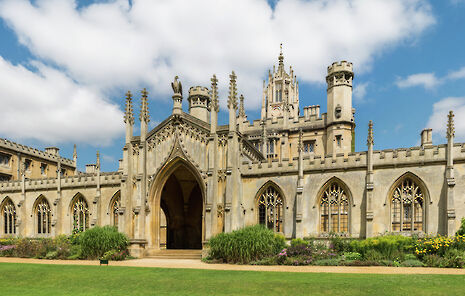Forget the Signet Ring – why has no one made a fuss about ‘Sign On’?
John’s students don’t live up their political stereotype, so why has this classist sports chant persisted, asks Katherine Males.

“Sign on, sign on, with tears in your eyes, because you’ll never be at John’s” - The first time I heard this college rugby chant bellowed so loudly at such a slow, stomping pace, I wanted the ground to eat me up. This was a tribe I was part of and the song was emanating from the mouths of my lovely new friends. It’s incredibly easy to be swept up by group behaviour, and university life is littered with similar examples.
The song isn’t original, and it’s not a very historical college tradition. It was born amongst Man United fans in response to Liverpool’s ‘You’ll Never Walk Alone’, and has always carried a very explicit reference to recipients of Jobseekers Allowance. It originally goes ‘Sign on, sign on, with no hope in your heart, because you’ll never get a job.’
A loathing towards those receiving benefits represents a cruel attitude within society; that of the ‘striver vs. skiver.’ It ignores the structural mechanisms of privilege, and blames the poor for their poverty.
"The tribal mentality of sports matches can sweep anyone away"
There is also no reason why academic or sporting success should be related to economic privilege. Thus, with the rationality of most Cambridge students in mind, I’ve tried to figure out why the song has survived. Those partaking in singing ‘Sign On’, either:
1. Are genuine snobs - they really do view those who receive benefits as inferior.
2. Are ignorant- they don’t understand that it refers to signing onto JSA, as they’ve never been exposed to this part of life. These singers must have never enquired into the meaning of the song (maybe assuming it’s another ambiguous sports phrase akin to ‘chalk it up’).
3. Are torn bystanders - they understand the classist and snobby connotations, and might even feel uncomfortable with this. But they sing along because they want to support their rugby team and enjoy the communality of sports chants.
4. Believe its harmless – they understand the song’s connotations, but don’t think this matters – it’s only banter!
I can’t imagine that many students at John’s actually fit into the first category. ‘Sign on’ is hardly representative of the college student population – John’s is brimming with cool people with good, wholesome ideas. Despite the college’s socially conservative reputation, there is a general consensus that ‘Sign On’ is politically incorrect.
Yet the tribal mentality of sports matches can sweep anyone away, and I’m certainly not innocent. By preserving this song in sports culture, we’re massively letting ourselves down; the song’s survival indicates that we don’t think the political implications of the song matter enough.
It can seem harmless that one Cambridge college would sing the song to another, as both represent elite institutions. But the prominence of this song doesn’t sit well with the John’s stats. John’s is the second wealthiest Cambridge college, and by playing into its reputation as socially elite and conservative, it is made less accessible to students from socio-economically underprivileged backgrounds.
The belief that it is harmless to sing ‘Sign on’ suggests no consideration that any student present might receive benefits or have parents or relatives on the dole. It is sung with the assumption that the entire population of St John’s is wealthy and will be wealthy in adulthood, equating achievements and talent with wealth. It goes without saying that this is insensitive, elitist, and uncompassionate.
This feels like an incredibly obvious article; however, the fact that I considered that it might represent social suicide, reiterates the importance of open discussion about sports culture at Cambridge. Good people shouldn’t be associated with toxic attitudes, and we must reject such classist phenomena
 Features / Should I stay or should I go? Cambridge students and alumni reflect on how their memories stay with them15 December 2025
Features / Should I stay or should I go? Cambridge students and alumni reflect on how their memories stay with them15 December 2025 News / Cambridge study finds students learn better with notes than AI13 December 2025
News / Cambridge study finds students learn better with notes than AI13 December 2025 Comment / The magic of an eight-week term15 December 2025
Comment / The magic of an eight-week term15 December 2025 News / News In Brief: Michaelmas marriages, monogamous mammals, and messaging manipulation15 December 2025
News / News In Brief: Michaelmas marriages, monogamous mammals, and messaging manipulation15 December 2025 News / Uni Scout and Guide Club affirms trans inclusion 12 December 2025
News / Uni Scout and Guide Club affirms trans inclusion 12 December 2025










